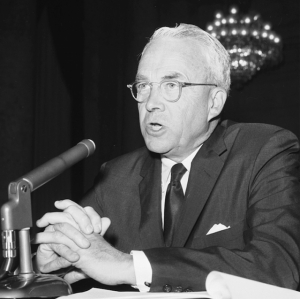
In his two terms as the fifty-second mayor of Atlanta from 1962 to 1970, Ivan Allen Jr. transformed the city from an economically stagnant and segregated town of the old South into a burgeoning international city at the forefront of civil rights. His leadership spanned business and industry, urban infrastructure, education, the arts, sports, and international relations.
Allen was a witness in action through an era of dramatic social change in Atlanta. As mayor, he was evolving as a “man of conscience” in the early 1960s, striving to reconcile his personal vision with a highly polarized public opinion. Allen struggled through the 1962-1963 Peyton Road Wall affair; nonetheless, he stood out as a progressive leader when he became the only southern mayor to testify before the Senate Commerce Committee in 1963 in support of the Civil Rights Act of 1964. Allen’s leadership in the face of racial and social tensions serves as his enduring legacy.
Allen graduated from the Georgia Institute of Technology in 1933, and the Institute was entrusted with stewardship of his legacy in 1990 with the founding of the Ivan Allen College of Liberal Arts. The Ivan Allen Jr. Digital Collection is an initiative of the College to carry forward and expand upon Allen’s transformative urban policies and his values of social courage, social justice, and ethical action as a foundation for the modern context of our lives and work.
Within the collection is the Mayoral Records Archive, a digital humanities project that collects the digitized mayoral records of Ivan Allen Jr. The archive collects material from one of the most historic decades in Atlanta’s history. It functions as the primary digital repository for the history of Mayor Allen’s role in the passage of the Civil Rights Act, the history of race relations in 1960s Atlanta, construction of the Atlanta Stadium, massive changes in desegregation, infrastructure, housing, and transportation overseen by Allen’s administration, and much more.
Originally digitized by a team of researchers and students with the support of the Digital Integrated Liberal Arts Center (DILAC) and funded by the Mellon Foundation, this Omeka-based project continues to be developed as a pedagogical resource for use in the Writing and Communication Program at Georgia Tech.
